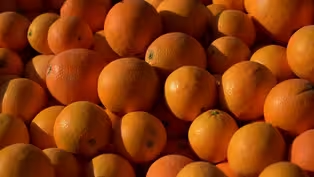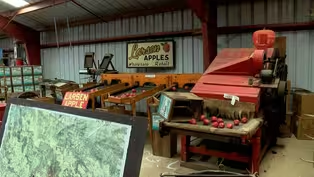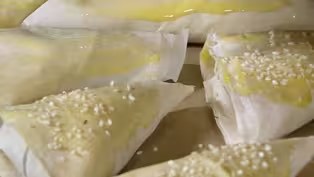
“Everything in a Salad” Farm
Clip: 6/30/2023 | 5m 38sVideo has Closed Captions
Visit a lettuce and herb farm that grows just about “everything in a salad.”
Visit a lettuce and herb farm that grows just about “everything in a salad.” The Ratto family immigrated to America from Italy in 1878. Ratto Brothers was founded by Antone Ratto, who was known as the "Market Man" delivering vegetables to customers with a horse drawn carriage – the company's logo today.
Problems playing video? | Closed Captioning Feedback
Problems playing video? | Closed Captioning Feedback
America's Heartland is presented by your local public television station.
Funding for America’s Heartland is provided by US Soy, Sustainable Agriculture Research and Education, Rural Development Partners, and a Specialty Crop Grant from the California Department of Food and Agriculture.

“Everything in a Salad” Farm
Clip: 6/30/2023 | 5m 38sVideo has Closed Captions
Visit a lettuce and herb farm that grows just about “everything in a salad.” The Ratto family immigrated to America from Italy in 1878. Ratto Brothers was founded by Antone Ratto, who was known as the "Market Man" delivering vegetables to customers with a horse drawn carriage – the company's logo today.
Problems playing video? | Closed Captioning Feedback
How to Watch America's Heartland
America's Heartland is available to stream on pbs.org and the free PBS App, available on iPhone, Apple TV, Android TV, Android smartphones, Amazon Fire TV, Amazon Fire Tablet, Roku, Samsung Smart TV, and Vizio.
Providing Support for PBS.org
Learn Moreabout PBS online sponsorship♪♪ California's Central Valley, where nearly half of all the fruits, vegetables and nuts produced in the U.S. are grown.
Almost everywhere are tapestries of almond trees in full bloom, and row after row of gorgeous greens.
This is Modesto, home to Ratto Brothers, a family farm four generations strong.
It's a sprawling operation, growing 35 vegetable and herb varieties on more than 1500 acres of land.
Theirs is a story of a hard-working immigrant family that tamed and cultivated new ground to plant seeds that still thrive more than a century later.
[Frank Ratto] I always think, what would my father and his brothers and my grandfathers say today about where our business is, what we're doing and how we're doing it?
And what we're doing today, for my grandfather, would be like going to the moon to him.
And I- And that gives me chills, just to talk about it.
Frank Ratto, president of Ratto Brothers, has deep roots on this land.
He's been farming here since he was four years old, learning from his grandfather, founder Antone Ratto.
Antone's father, Giovanni Ratto, emigrated to America from Italy in 1878.
At the age of 16, young Antone traded school for a shovel, planting the family's first seeds near Oakland in 1905.
Antone was known as "the market man," delivering vegetables to customers with a horse-drawn carriage, the company's logo today.
[Frank] If Grandpa were here today, he would look at this field and say, "You know what?
We've always raised beautiful produce like this," and we're proud of that.
But I think it's what happens after the product leaves the field is what he would never ever imagine could happen.
They get to the end customer looking virtually just like this when it arrives.
It's really a- I don't...
I don't think the family or Grandpa could ever imagine how the chain of quality continues.
The family chain continues today with the fourth generation of Rattos.
Frank's two sons, Nick and Jeffrey, and nephews Anthony and Andrew oversee planting, harvesting, production and sales.
Ratto Brothers grows just about everything you'd find in a salad, from leafy greens and kale, chard and parsley.
[Rob Stewart] I've never smelled parsley that has such a... a living flavor.
I mean, this- the scent of this is just so alive.
[Anthony Ratto] It... it is.
And it's fresh.
We might harvest this product today or tomorrow, and it'll be on the... the shelf of the grocery store the day after or two days after, depending on the end destination of that.
[Rob] Wow!
And this goes all across North America.
[Anthony] Yeah.
I mean, one of the coolest experiences for me, personally, is going to a Publix market in Florida and seeing your product on the shelf, or going to Hawaii and finding parsley in Hawaii.
And we're farming in California, and it's- it shouldn't be lost on people but, uh, at times, the conditions for farming in California are... are really challenging, to put it lightly.
[Rob] And expensive.
[Anthony] Uh, without a doubt.
Very expensive to do.
Um, and so, you're trying to be as efficient as possible.
Nick Ratto is Frank's son, and in charge of all harvesting.
Before each seed is planted, both sales and growing teams must align.
[Nick] So, as you can see, a truck behind us is pulling out.
It's going to pull up to the facility, and today, it's a nice day- it's about 50 degrees out here- so the product's not too hot.
[Rob] And that's 5 minutes away.
[Nick] 5 minutes away.
But on a summer day when it's 95, this is hot, this is warm.
So, it goes through a hydro wash before it goes in the facility, which brings it down to the temperature it needs to be.
And from the time it goes through the hydro wash, it goes directly into the building at a certain temperature.
[Rob] They're headed there now.
[Nick] Headed there now, right behind us.
And it will not break that cold chain until the produce guy in whatever grocery store you go to- right?
- puts it out and puts it on the shelf.
This is Ratto's massive state-of-the-art cooling, processing and shipping facility.
It's more than 100,000 square feet, an action-packed center, where fresh vegetables are always on the go.
Nick has been on this land since he was six years old.
On this day, Nick is leading the chard harvest, the second picking of this season by hand.
Chard grows back from the roots up to three times per plant.
Knowing exactly when to harvest each crop is a big responsibility.
[Nick] But the one thing that I know is people have to eat.
Right?
That's one thing that's never going to go away.
And if you can be on the nutritional side of that, I mean, you're in a much better place.
And it's something you can be proud of.
Everybody's talking about how your body feeds off what you eat- right?
- from your toes to your mind.
Um, and to be on the positive side of that, I mean, what more could you ask for?
[Rob] It does make a tremendous difference.
[Nick] Yeah.
[Rob] This is... this is soul and cell food.
[Nick] Mind, body and soul.
[Rob] Yeah, absolutely.
Frank Ratto says they found the perfect recipe for farm family success- a lot of heart, rooted in hard work.
He says he's grateful not to be alone.
[Frank] Farmers of America today are doing that across the United States and across the globe, because making sure people get nutritious, healthy food to eat is what's most important.
Video has Closed Captions
Clip: 6/30/2023 | 5m 36s | Mandarin farmers explain why this tiny, easy-to-peel fruit is exploding in popularity. (5m 36s)
Video has Closed Captions
Clip: 6/30/2023 | 2m 45s | Discover all the delicious treats that California’s Apple Hill has to offer to visitors. (2m 45s)
Spanakopita – Farm to Fork with Sharon Profis
Video has Closed Captions
Clip: 6/30/2023 | 5m 37s | We’ll show you how to make a popular Greek recipe, Spanakopita with Tzatziki sauce. (5m 37s)
Providing Support for PBS.org
Learn Moreabout PBS online sponsorshipSupport for PBS provided by:
America's Heartland is presented by your local public television station.
Funding for America’s Heartland is provided by US Soy, Sustainable Agriculture Research and Education, Rural Development Partners, and a Specialty Crop Grant from the California Department of Food and Agriculture.


















